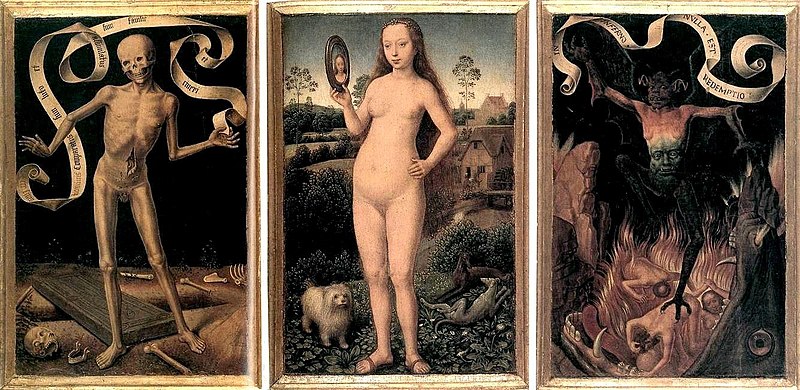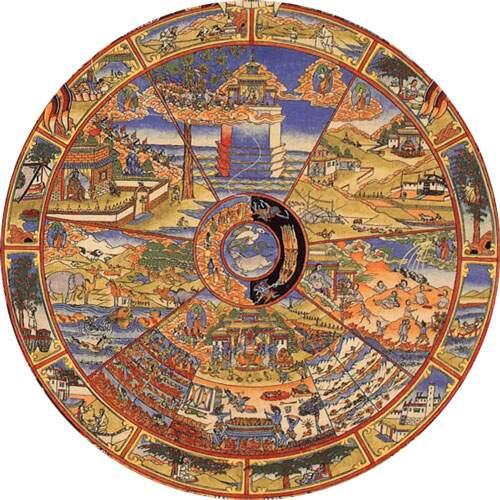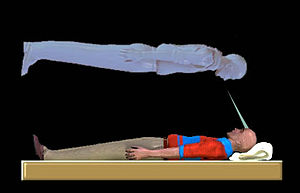Since the dawn of time mankind has pondered the verisimilitude of the concept of post-life actuality. Across the eons of the space-time continuum many cultures and societies have some sort of belief in a transcendent plain. As the Native Indian proverb, attributed to Chief Seattle says "there is no such thing as death, only a change of worlds". Although recent scientific explorations may counter this, attributing it to psychology, a Freudian style subconscious fear of the unknown, "out of body experiences" suggest our human understanding may not fully understand this concept we view as death.
 To answer the almost clichéd question of "is there life after death", we must first consider on what the definition of life is. Do our feelings make us alive? But can someone in a coma, or a plant feel? In popular culture with the BBC TV series Life on Mars, the bar tender Nelson tells the protagonist Sam Tyler that you are only alive if you can feel. When Tyler awakes in the "real world" he cannot feel pain when he accidental cuts his finger, he then has the notion he was more alive in the "70s world". So are there "degrees" of life, could we classify a human being as being more alive than a vegetable, or a squirrel? Is life just a concept? As humans we tend to view it as the opposite of life. Nietzsche comments on these views, claiming “Let us beware of saying that death is the opposite of life. The living being is only a species of the dead, and a very rare species at that”.
To answer the almost clichéd question of "is there life after death", we must first consider on what the definition of life is. Do our feelings make us alive? But can someone in a coma, or a plant feel? In popular culture with the BBC TV series Life on Mars, the bar tender Nelson tells the protagonist Sam Tyler that you are only alive if you can feel. When Tyler awakes in the "real world" he cannot feel pain when he accidental cuts his finger, he then has the notion he was more alive in the "70s world". So are there "degrees" of life, could we classify a human being as being more alive than a vegetable, or a squirrel? Is life just a concept? As humans we tend to view it as the opposite of life. Nietzsche comments on these views, claiming “Let us beware of saying that death is the opposite of life. The living being is only a species of the dead, and a very rare species at that”. One controversial topic in the scientific community is the validity of so called "out of body experiences". Many people have claimed to have experienced such events, medical patients for exams can recount witnessing an operation being performed on their unconscious bodies from a position elsewhere in the room. Some patients can recall what occurred in the procedure, or the types of medical instruments the doctors used. Of course, this arouses suspicion, many claiming out of body experiences, or OOBEs to be "pseudo-science". You may ask what this has to do with an afterlife. Well let's say OBEEs are true. This implies the conscious can survive without the body. If this is true is there a need for food, water or things physical humans need? If the physical body is destroyed, could this "spiritual body", or "soul" survive in what is effectively the afterlife. This form of existent could potential explain what society has labelled ghosts, poltergeist or spirits (if there is any credit to such claims). OOBEs also seem to support the Platonic concept of the soul; that the soul is a separate entity to the body.
Although the concept of life after death is appealing, this concept of an afterlife may be down to the psychological sub conscious rather than truth. Humans often search for meanings, refusing to see things as arbitrary or without purpose. This craving for a purpose to life may just be down other Freudian concept of the "Id", the part of the mind that constantly seeks pleasure, and what may want this pleasure to continue beyond death. The notion of an afterlife may also result from Freud's "Superego", the part of the mind that embodies parental and social values of justice and morality. The Superego wants justice to be served, which may account for why many religions and beliefs hold the views in that death leads to judgement, and later punishment of reward for moral behaviour.
Although the concept of life after death is appealing, this concept of an afterlife may be down to the psychological sub conscious rather than truth. Humans often search for meanings, refusing to see things as arbitrary or without purpose. This craving for a purpose to life may just be down other Freudian concept of the "Id", the part of the mind that constantly seeks pleasure, and what may want this pleasure to continue beyond death. The notion of an afterlife may also result from Freud's "Superego", the part of the mind that embodies parental and social values of justice and morality. The Superego wants justice to be served, which may account for why many religions and beliefs hold the views in that death leads to judgement, and later punishment of reward for moral behaviour.
Immanuel Kant actually put forward and argument that attempts to postulate an afterlife through undeniable rationalism. Kant viewed morality as being absolute and existent. Kant countered the idea of moral relativism by stating moral norms have authority beyond what society states, for example William Wilberforce held the believe, which Kant may have supported, that "slavery may be approved of by society, but it is morally wrong". After accepting these moral absolutes, Kant went on to question why humans should follow them, and not behave arbitrarily. Kant also made the observation that there is little justice in the world, murderers can get away with homicide, and the innocent may be imprisoned under a false conviction or for preaching universal rights. Kant believed that as morality existed, there must be a reason for it, and we should follow it because of justice. However as justice is not present in this life, Kant stated there must be a time after this life, an afterlife, where justice is carried out. Of course, morality may well e relative, and Freud's psychoanalysis above could be considered as a counterargument to Kant's postulation.
Many religions hold beliefs in an afterlife. The Abrahamic religions, e.g. Islam, Judaism and Christianity state after death we will be judged (although Islam states this will not occur until the day of judgement) and what happens next depends on our actions during the time we were alive. Generally, if you have followed God and been a good person, you may go to paradise, or heaven. However if you have ignored God and been immoral, you may end up in hell, although this believe varies depending on religious denomination. What these religions do have in common though is that this life is not the end. The Qu'ran for example states in
Surah II: 154 “And call not those slain in the way of Allah “dead.” Nay, they are living, only ye perceive not." Some religions believe what happens in the afterlife depends on what religion you follow. The Bible claims Jesus said the only way to get through heaven is through him, whilst the Qu'ran claims "there is not compulsion in religion". Personally I feel the Christian viewpoint of heaven is flawed. The Bible states, or at the very least, heavily applies that animals cannot get into heaven. However animals, such as cats, show high levels of sentience, and it seems arrogant, or speciestist that only humans are entitles to an afterlife.

Buddhism has a different take on the afterlife, and what is an afterlife depends on the interpretations of Buddhist teachings. Buddhists believe in anattā, the notion that there is no "self". Buddha taught that the idea of a permanent metaphysical self or soul is an illusion. If we are all one, not as separate individuals then the "self" cannot die, as there is no self to begin with. Therefore death does not exist in the conventional sense as there is no being to die. However Buddhists also maintain the belief in Samsara, a continuous flow of life, death and rebirth. Life is not considered to begin with birth and end in death, but as a continuous existence in the present lifetime of the being and extending beyond. Each birth is determined by actions in the last life, known as Karma. The individual normally has no knowledge of the previous life. However it is questionable whether or not this is truly an afterlife. Malcolm X claimed "memories make us human. Without them we are demoted to the lower animals". If it is our memories that make us who we are, and in the afterlife we have no memories, we are no longer the same person. Although Buddhism would not deny this, as this supports the three marks of existence.

In a broader sense, perhaps it is obvious that we will live for ever, at least to some extent. Those who are dead still live on within our memories, or photos- some people will never be forgotten. This may seem a nice thought but very few are actually remembered today. Plato may have immortality, but his grandmother does not. As Nietzsche says in a rather depressing way, “Only strong personalities can endure history, the weak ones are extinguished by it”. However as long as you do remember someone, or have an idea of them, they live on, "Ideas are more than flesh, a man can fail , he can be killed. But ideas do not bleed. Ideas are bulletproof", is one of the main themes of the film "V for Vendetta".
But what are the implications of an afterlife? Belief in an afterlife can potentially be dangerous, and be manipulated. People can sometimes do insane things in order to have a good afterlife, suicide bombers, for example. But people can also turn to the extreme if they feel there is no life after death, that life is meaningless and Kantian justice is simply an ideal. Could an afterlife have implications on capital punishment? If we disocver there is no life after death, and this is an undeniable truth, would it be an absolute wrong to kill someone? Everyone is unique, and killing someone would be destroying them totally and completely erasing them from existence. But if there is an afterlife, does it make it more permissible to kill, if they won't really die? Perhaps it is better not knowing what happens after death.
"So many great nobles, things, administrations, so many high chieftains, so many brave nations, so many proud princes, and power so splendid; In a moment, a twinkling, all utterly ended" - Jacobus de Benedictus
 |
| An interpretation of death made using Microsoft word 2003 |



